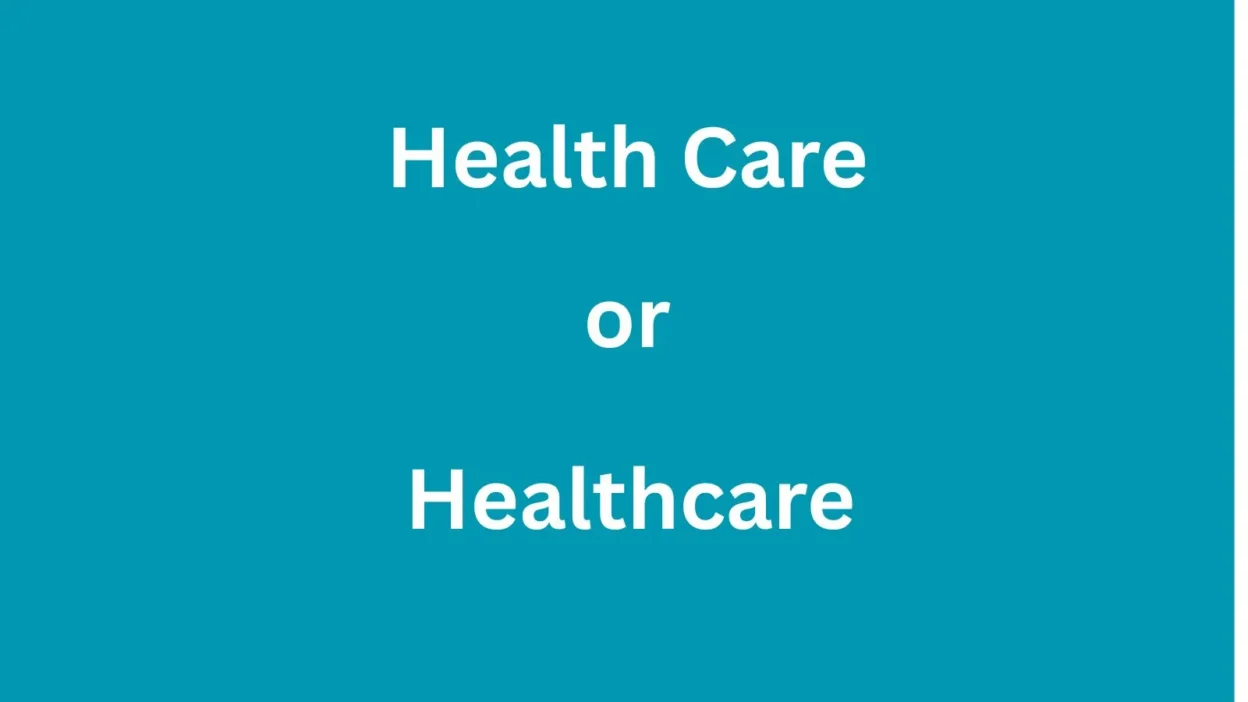Have you ever stopped while writing and wondered whether to use “Health Care” or “Healthcare”? 🤔
You’re not alone! This confusion isn’t just common among students — even writers, bloggers, and professionals face it. When creating health-related or medical content, using the correct spelling is super important; otherwise, your writing might look a bit unpolished or unprofessional.
In this article, we’ll break down the difference between the two terms in simple words, explain where each is used, and find out which one experts actually prefer. So, if you want to clear up this confusion and take your writing to the next level — keep reading!
Health Care or Healthcare – Quick Answer

Both spellings are correct — but they are used differently:
- Health care (two words) is the preferred form in American English when referring to the system, services, or professionals involved in medical care.
- Example: The health care industry is growing rapidly in the U.S.
- Example: The health care industry is growing rapidly in the U.S.
- Healthcare (one word) is commonly used in British English and increasingly accepted globally, especially in corporate and digital contexts.
- Example: The UK government focuses on improving healthcare services.
- Example: The UK government focuses on improving healthcare services.
✅ In short:
Use “health care” for U.S. formal writing, and “healthcare” for UK, business, or modern digital use.
The Origin of Health Care / Healthcare

The word health care originated from the combination of health (meaning well-being) and care (meaning attention or treatment).
In early English, writers always kept the two words separate. However, over time — particularly in the 20th century — people began combining them into one word (healthcare) for convenience, much like email evolved from electronic mail.
By the 1980s, both spellings were in use, but professional institutions such as the American Medical Association (AMA) continued to prefer the two-word version. Meanwhile, businesses and tech companies started using the single word healthcare for branding simplicity.
British English vs American English Spelling

| Region | Preferred Spelling | Example Sentence |
| United States | Health care | The U.S. health care system is one of the most complex in the world. |
| United Kingdom | Healthcare | The NHS provides free healthcare to all residents. |
| Canada & Australia | Healthcare (common), Health care (also accepted) | Canada spends billions on public healthcare. |
| Global Business Use | Healthcare | Healthcare startups are leading innovation in medical technology. |
✅ Tip:
If your audience is global, “healthcare” tends to look more modern and unified.
Which Spelling Should You Use?

The right choice depends on who you’re writing for:
- For American readers or academic papers: use “health care” (two words).
- For UK, Commonwealth countries, or online publications: use “healthcare” (one word).
- For brand names or modern contexts: “Healthcare” looks more professional and sleek.
👉 Example:
- American report: Health care policies affect millions of citizens.
- British report: Healthcare reform is vital to national well-being.
Common Mistakes with Health Care / Healthcare
- ❌ Writing healthcare provider in formal American English (should be health care provider).
- ❌ Mixing both forms in one article.
- ❌ Using “healthcare” when referring to a specific person (e.g., a healthcare worker is fine, but healthcare he provides may be awkward).
- ✅ Be consistent — whichever spelling you choose, stick with it throughout your text.
Health Care / Healthcare in Everyday Examples

- Emails: “Our company offers affordable healthcare plans.”
- News headlines: “Health care costs continue to rise in the U.S.”
- Social media: “Improving global healthcare access is everyone’s responsibility.”
- Formal writing: “The health care sector contributes significantly to the national GDP.”
Both versions appear often, but consistency and context matter most.
Health Care or Healthcare – Google Trends & Usage Data

According to Google Trends, “healthcare” (one word) dominates worldwide search results, especially in business and digital media.
In contrast, “health care” remains strong in U.S. government and academic documents.
| Country | Most Common Form | Context |
| United States | Health care | Official and academic writing |
| United Kingdom | Healthcare | Everyday and institutional use |
| Canada | Healthcare | Public communication |
| India | Healthcare | Technology and startup industries |
✅ Insight:
If you’re optimizing content for SEO or marketing, “healthcare” performs better globally.
Dwarfs or Dwarves: The Surprising Story Behind These Two Words
FAQs about Health Care or Healthcare
Q1: Is “healthcare” wrong in American English?
No. It’s not wrong, but “health care” (two words) is still more traditional in the U.S.
Q2: Can I use “healthcare” in formal writing?
Yes, especially in British English or modern global communication.
Q3: Why do Americans prefer “health care”?
Because traditional style guides like the AMA Manual of Style recommend the two-word form.
Q4: Is there any difference in meaning between “healthcare” and “health care”?
No real difference — only spelling and regional preference.
Q5: Which is better for SEO?
“Healthcare” (one word) usually ranks higher and is more widely searched globally.
Q6: Should companies use “healthcare” or “health care” in branding?
Most companies choose “healthcare” — it looks modern and is easier to read.
Q7: Can I use both forms in one article?
It’s better not to. Choose one and stay consistent throughout your text.
Conclusion
The debate between health care and healthcare is all about context, audience, and style — not meaning.
If you’re writing for an American audience or in a medical research paper, stick to “health care”.
If you’re addressing a global audience or writing for a business, digital platform, or modern publication, go with “healthcare”.
Both are correct — but consistency and awareness of your audience make your writing professional and clear. Whether you’re crafting an academic essay, company report, or blog post, knowing when to use each form will help you sound accurate and confident.

Amelia Whitford is a talented writer at lingorae.com, known for her clever wit and engaging style.
A true master of puns, she crafts playful wordplay that entertains and inspires readers.




